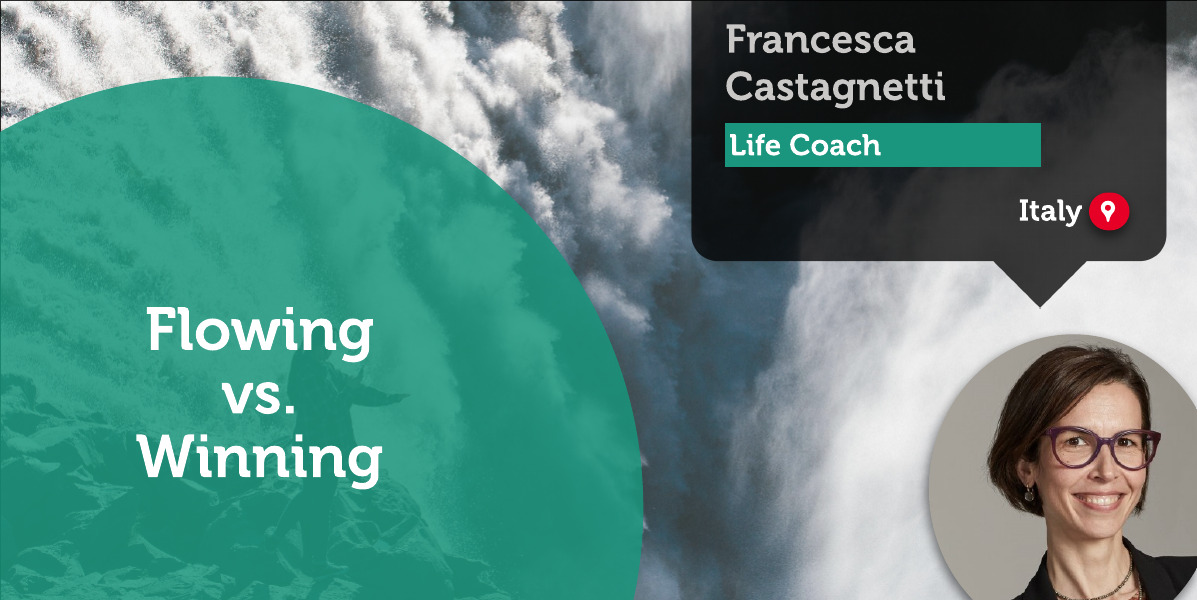A Coaching Power Tool By Francesca Castagnetti, Life Coach, Design Coach, ITALY

Redefined the Perspective: Flowing vs. Winning
Flowing vs. winning are two themes that are very dear to me. I have experienced these two very different ways of looking at things and they completely redefined the perspective with which I look at my entire existence.
Flowing vs. Winning Definition
Flowing:
Being in a flow is that optimal state in which things feel effortless. Flow is characterized by the confidence given by the ability to master a task, therefore generate progress for yourself; when you are in a flow we feel mindful, present, aware, and fully engaged in the moment whatever you are doing and in movement; flow is also made of a sense of purpose, as you feel you can make an impact and create value for ourselves and for those around us. Flowing isn’t necessarily about being productive, it’s about feeling connected, fulfilled, motivated from within, and energized.
When you are in your flow, there is energy, dedication, optimism, confidence, freedom, and an unparalleled sense of faith. When you are in your flow, you find purpose, and your thoughts are aligned with your actions, words, and intentions to that purpose, which is therefore manifested through your entire authentic being.
When all these conditions are met magical things start to happen as you are more open to the world, your perspective has shifted which allows you to design and create choices for yourself and you are ready to welcome everything that comes your way, with faith and confidence that you will be able to master it.
When you are flowing, you deeply feel that what you are doing truly matters. When you are flowing there are no voids to fill, as there is abundance.
When you are flowing you can continue to create and design.
Winning:
Winning is about scoring a victory in a contest or competition. Winning may be represented by several things: being number one, reaching the highest business result, climbing at the highest peak of the ladder, defeating your competitors (whether it’s a person or an antagonist circumstance that you are presented with or that your limiting beliefs create for yourself).
When you organize yourself to win often the score is more important than the inspiration and the motivation that is moving you. Often your values don’t match your behaviors. When you prioritize the score and the result, per se, that’s when you may be more prone to overlook the how, because you are mostly focused on the what.
The culture of winning is a widespread practice across most corporations around the world: focusing on the result, solely, can accidentally incentivize behaviors such as hoarding information, ignoring how others feel around you, and an excessive amount of energy being poured into a number of actions that will lead to a result with an end. When employees act only for the sake of winning, what ends up happening is a decline in trust, decline in cooperation, decline in fun, decline in creativity, and innovation. I have experienced this throughout my entire career, and I found myself wondering, in more recent times, if there is no other way to motivate people to strive and give their best, which leads to fulfillment and ultimately more sustainable wealth for organizations.
At a personal level, the focus on winning may lead to the sense of “if something isn’t hard, challenging enough or doesn’t cause me discomfort, sacrifice, tremendous work then it means it’s not worth it”. Another feeling that often comes up and that I noticed in several clients is: “This was too easy, it felt too good, there must be something wrong, it can’t be true”.
What I observed is that the problem with a winning-oriented approach is that often the results depend on perceptions, which we know are a very tricky thing especially when perceptions become judgments through the lenses of our own expectations and limiting beliefs. Another issue with approaching things with a winning-focused approach is that the target is always moving – once you win, you will most likely need to continue winning or finding another target for yourself, to fuel the temporary gain that you would get from the achievement.
My own drive towards “winning”, for example, was fueled by low esteem in myself and the belief that I was unworthy no matter how much I worked and how hard I tried. So, with these triggers playing out in the background, I have been drawn, for more than half of my life, towards situations that weren’t necessarily healthy for me, especially when it came to sentimental relationships and human interaction.
It did serve me, however, to continuously push me towards achieving several so defined “successes” in my life, which are the same successes that I found myself questioning in the last years. Insecurity, inadequacy, fear, and judgment were continuously fueling me but wearing me out at the same time.
Flowing vs. Winning: How Did I Change Perspective and Find My Flow?
The greatest gift that happened to me was no matter how hard I tried; I wasn’t winning anymore. I was failing (according to my existing beliefs). So, I started asking myself:
“What does winning really mean for you?”
“What do you want to win?”
“What is the price of winning?”
But the most powerful question I found the courage to ask myself was:
“If you win, what are you losing? If you lose, what are you winning”?
I realized then that the more I was “winning”, the more I was losing myself, moving away from my true purpose, my values, the trust in myself, my talents, and my presence, in other words, I was drifting away from my flow.
References
Even if You're Languishing or Dormant, You Can Still Find Flow - Clay Drinko, Ph.D.
How to stop languishing and start finding flow – Adam Grant (Ted Monterey)
There’s a Name for the Blah You’re Feeling: It’s Called Languishing – Adam Grant (New York Times)